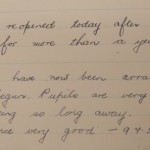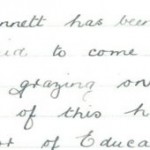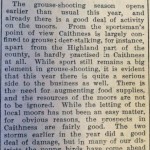This week German forces in Russia finally eradicated the “Smolensk pocket”, capturing 300,000 Soviet soldiers as well as the city itself. In the north, German armies began the final advance towards Leningrad, with orders to destroy the city and take no prisoners. Meanwhile, supplies were finally getting through to the island of Malta; on 10 August a convoy of merchant ships delivered 85.000 tons of desperately-needed supplies.
 Across Caithness, schools returned after the summer holidays. (But only for a month; they would break up again in September so that pupils could help with the harvest.) Ackergill School reopened after being closed for a year: the school had been closed because it was deemed too close to Wick airfield to guarantee the children’s safety, but the parents had not agreed to their children being educated elsewhere. As the head teacher caustically noted in the log book: “Pupils are very backward from being so long away”.
Across Caithness, schools returned after the summer holidays. (But only for a month; they would break up again in September so that pupils could help with the harvest.) Ackergill School reopened after being closed for a year: the school had been closed because it was deemed too close to Wick airfield to guarantee the children’s safety, but the parents had not agreed to their children being educated elsewhere. As the head teacher caustically noted in the log book: “Pupils are very backward from being so long away”.

Not all pupils found it an easy matter to return. The Brabster School log book records: “Frank Dunnett has been absent all week. He is afraid to come to school, because of a bull grazing on open moorland. Intimation of this has been sent to the Director of Education.”
 The same Director of Education set out in a letter how the schools were responding to the Dig for Victory campaign of growing crops on school grounds. Some five acres had been placed under cultivation. “Children get their parents or relations to help with the heavy work and they themselves do all the planting and attend to the crop… The great bulk of the seed is provided voluntarily by the children and the proceeds are placed at their disposal in a school fund under care of the teacher.”
The same Director of Education set out in a letter how the schools were responding to the Dig for Victory campaign of growing crops on school grounds. Some five acres had been placed under cultivation. “Children get their parents or relations to help with the heavy work and they themselves do all the planting and attend to the crop… The great bulk of the seed is provided voluntarily by the children and the proceeds are placed at their disposal in a school fund under care of the teacher.”

Unexploded bombs and shells continued to be a hazard of daily life in the county. The Police Station at Wick received the following message on 4 August: “A shell has fallen opposite the croft of Slickly, Lyth, occupied by Murray. It did not explode. Spence, Slickly, reported the matter here (i.e., Police Station) and said it occurred about 19.35 hours.”
 Finally this week, the John O’Groat Journal reported the start of the grouse-shooting season: “and already there is a good deal of activity on the moors. From the sportsman’s point of view Caithness is largely confined to grouse; deer-stalking, for instance, apart from the Highland part of the county, is hardly practiced in Caithness at all… The two storms earlier in the year did a good deal of damage, but in many of our districts the young birds have come ahead much better than expected.”
Finally this week, the John O’Groat Journal reported the start of the grouse-shooting season: “and already there is a good deal of activity on the moors. From the sportsman’s point of view Caithness is largely confined to grouse; deer-stalking, for instance, apart from the Highland part of the county, is hardly practiced in Caithness at all… The two storms earlier in the year did a good deal of damage, but in many of our districts the young birds have come ahead much better than expected.”
